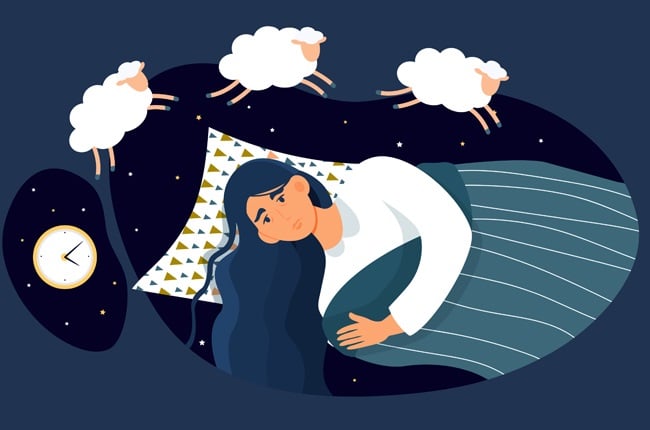
- You could have insomnia if you're struggling with a lack of sleep affecting your day-to-day activities.
- Dr Alison Bentley explains two types of insomnia - acute and chronic.
- In some cases, insomnia can be brought on by medical conditions such as anxiety and depression or other sleep disorders such as sleep apnoea.
- If you think you may be struggling with insomnia, speak to your doctor to find the cause behind it and the proper treatment.
It's time for bed, but instead of drifting off to sleep, you toss and turn for a couple of hours, and when someone questions how you're feeling the next day, you casually refer to your lack of sleep as insomnia and tell of how you struggled to catch some Z's.
While insomnia is a condition that affects many people, the term is often used indiscriminately to describe any form of sleep disturbance. But, there are particular criteria for diagnosing insomnia, and there are different types of insomnia, explains Restonic sleep expert Dr Alison Bentley.
"It's easiest to describe insomnia as a reduced quantity of sleep," says Dr Bentley. "But, to have insomnia, the reduction in hours of sleep has to cause some kind of problem with daytime function. This could range from poor concentration to memory problems, trouble focusing on tasks that need to be done, and fatigue."
Apart from a drop in daytime function, she adds that insomnia can have a number of long-term effects on health. This includes cardiac issues and metabolic disorders.
According to Dr Bentley, there are three main symptoms of insomnia:
1. Trouble falling asleep.
2. Waking in the middle of the night and battling to go back to sleep.
3. Waking too early in the morning.
Most people have more than one of these symptoms, and a particular symptom does not necessarily link to a specific cause.
READ MORE | Why sleeping in is bad for you: Expert explains how it could lead to poor sleep hygiene
Types of insomnia
Insomnia can either be acute or chronic. "Acute insomnia occurs when sleep is disrupted due to a specific stressor and in most people only lasts for as long as the stress does, after which it resolves, and sleep becomes normal again," explains Dr Bentley.
"The stress is often psychological. For example, someone might struggle with [insomnia] after the death of a loved one or during a period of intense work stress. It can, however, also be caused by a physical trigger, such as the development of a painful disorder, such as arthritis. Only a quarter of people with acute insomnia go on to suffer with chronic insomnia."
Chronic insomnia, on the other hand, occurs when someone experiences one or more of the three insomnia symptoms mentioned above at least three days a week for at least three months.
"At this point, it's usually not stress causing the sleeplessness, but changes in the way we think of sleep (cognitive issues), as well as some bad habits (behavioural issues) that we adopt to try to get more sleep," she says.
"These mean we worry more about our sleep and spend longer in bed trying to get more sleep, and both of these factors make our sleep problems worse."
READ MORE | Do you often feel like you're falling in your sleep? Here's why, and what your body does to stop it
Other reasons you could have insomnia
Insomnia can also be caused by other medical or sleep disorders, which include anxiety, depression, chronic pain, obstructive sleep apnoea and restless leg syndrome. There are some medications which have also been known to interfere with sleep.
And then there are times when your lack of sleep may have nothing to do with you but rather the mattress you're sleeping on. An ageing mattress can affect your sleep, and you may find it difficult to get comfortable when hopping into bed at night, leading to a longer sleep onset (time to fall asleep).
How do you know if you have insomnia?
"The number of hours usually quoted as constituting 'normal sleep' is 7 to 8 hours a night. However, this is not quite true," says Dr Bentley. "Yes, 7 to 8 hours is the average amount of sleep for a population. But there are many people who need more than that and some who need less."
How do you know how much sleep you need? Here's a mini experiment to try:
Let's say you're currently getting six hours of sleep but still feel fatigued; try to add another 30 minutes and then see how you feel. The number of hours of sleep that keeps you feeling alert during the day is the amount you need.
So if you get five hours of sleep a night and can't sleep any longer no matter how hard you try, but you still feel alert and energised during the day, you may be getting enough sleep for you as a naturally short sleeper. The number of hours is dependent on the individual.
If you think you may have insomnia, speak to your doctor. There are several conditions that cause insomnia, and treatment does not always need to involve sleeping tablets. But ignoring the problem does not result in improvement over time. Once insomnia has become chronic, it will generally continue unless specific action is taken.




 Publications
Publications
 Partners
Partners











